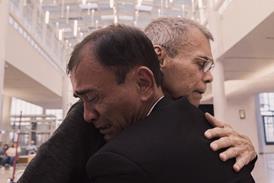The organisers of this year’s Tokyo International Film Festival are confident there is enough global goodwill towards Japan to attract international visitors to this year’s festival.
The Tokyo International Film Festival (TIFF) is gearing up for its 24th edition amid a remarkable year in Japan’s history. 2011 has been marked by large-scale tragedy, the spirit of rebuilding, economic uncertainty and artistic and scientific achievements.
With tourism to Japan plunging 60% in the first three months after the disaster and still down approximately 32% in August in tandem with an appreciating yen, TIFF chairman Tatsumi ‘Tom’ Yoda and secretary general Nobushige Toshima are nonetheless optimistic Japan’s biggest festival can maintain the international presence it has been building despite ongoing apprehension about radiation levels.
“We’ve assembled a wonderful selection of films and hope this contributes to Japan’s spirit,” says Yoda. Indeed, official mottos for this year’s event are “Believe! The Power of Films” and “Spirit of Japan!”
“Invitations to people attached to films or other guests of TIFF have gone smoothly, including early confirmation from the guests for our two opening films [Paul WS Anderson’s 3D spectacular The Three Musketeers and Jackie Chan and Zhang Li’s $30m historical epic 1911],” Toshima says.
He is satisfied there is a global sense of goodwill from people who want to see Japan make a comeback.
“There are many who want to come to Japan and even make efforts to help with the recovery,” he says. “I believe the guests of TIFF are attending with that same spirit and we’re very grateful for it.”
This year’s competition jury will be headed by US producer Edward R Pressman and includes Dutch producer Kees Kasander, Chinese actress Fan Bingbing, Japanese director Masahiro Kobayashi and special effects make-up artist Reiko Kruk.
‘We’ve assembled a wonderful selection of films and hope this contributes to Japan’s spirit’
Tom Yoda, TIFF
Yoda has led the festival’s eco-minded stance since taking on the position for an initial three-year tenure, and deciding to return again this year. “TIFF’s green carpet is now symbolic of Tokyo and this year we launch the TIFF Arigato Project in support of the [tsunami-ravaged] Tohoku region,” he explains.
The project will see TIFF venues collect donations through a wristband campaign and display messages of support from previous TIFF guests and big names in world cinema. Free screenings will also be held in Sendai for survivors of the disaster.
Global positioning
TIFF is one of only two International Federation of Film Producers Associations (FIAPF)-accredited competition festivals in Asia (the other being recent member Shanghai). A change in strategy and some high-profile outside assistance has seen TIFF’s line-up improve markedly in recent years.
Renowned UK producer Jeremy Thomas has served as competition selection advisor again for the second year, helping TIFF navigate a notoriously busy time in the global festival calendar.
“Landing high-quality world premieres in the fall is extremely difficult, particularly those from Europe or North America,” says TIFF programming director Yoshi Yatabe.
“They often go to Venice, Toronto or San Sebastian. Therefore we try to secure titles from Europe or North America as international or at least Asian premieres so that TIFF remains on the cusp of international trends in cinema to satisfy audiences. On the other hand, our strategy for Asian titles [is to have] world premieres.”
‘As the TIFFCOM market grows, screenings at TIFF become a valuable opportunity’
Yoshi Yatabe, TIFF
This year’s competition line-up includes the world premiere of Oxide Pang’s Sleepwalker from Thailand and Du Jiayi’s Kora from China. Sylvain Estibal’s When Pigs Have Wings (France-Belgium) is competing as an international premiere while Asian premieres of Pen-Ek Ratanaruang’s Thai crime film Headshot, Michael Winterbottom’s contemporary reworking of Tess Of The D’Urbervilles in India, Trishna, and Eric Toledano and Olivier Nakache’s French odd-couple comedy drama Untouchable are fresh from Toronto and San Sebastian.
TIFF works hard to appeal to foreign sales agents and distributors and has several clear advantages on its side. Significantly, its generous $50,000 grand prize is one of the highest in the festival world.
“Firstly, TIFF has the longest film festival history in Asia in a large market where audiences have always loved foreign films,” says Yatabe. “Secondly, as the TIFFCOM market grows, screenings at TIFF also become a valuable business opportunity for sellers. Finally, our festival obviously takes place in the great city of Tokyo and we improve our guest hospitality with each year.”
Market influence
In a territory where a Palme d’Or no longer guarantees any release at all and anything less than a foreign-language Oscar win does not affect box office in a significant way, TIFF’s own jury and audience prizes don’t generally guarantee success for independent international films. However, the trend may be slowly changing.
The 2008 jury prize-winner Four Nights With Anna became a Tokyo arthouse smash the following year, while Kamen Kalev’s 2009 multiple prize-winning Eastern Plays received a small theatrical run and successful DVD release. Last year’s director and audience prize-winner Sarah’s Key is being released in Japan by Gaga this December.





















No comments yet